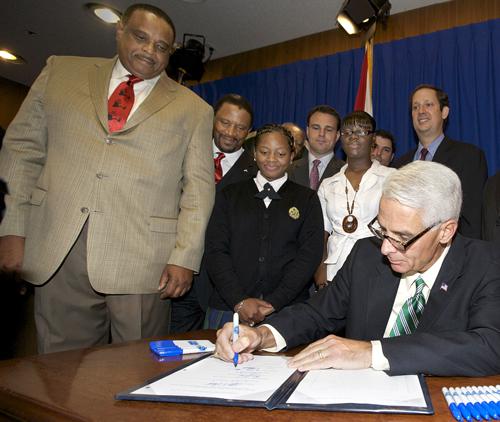Editor's note: Julio Fuentes is president and CEO of the Hispanic Council for Reform and Educational Options. This is the fifth post in our #schoolchoiceWISH series.
K-12 education is one of the hottest issues during every state’s legislative session. But when it comes to ed reform, bipartisanship does not come easy. Too often, when that reform bill hits the floor, whether it’s on accountability, choice or funding, civility goes out the door and the mentality of “us against them” takes over.
The nasty and insulting remarks that are hurled would send any child in school straight to the principal’s office. But bickering over whose agenda is more robust won’t get things resolved. And at the end of the day, we all want the best for our children.
So this is my school choice wish for the year 2014: I wish legislators across the country would work together to approach education reform with a bipartisan mindset. I wish for them not to let their party’s viewpoints blind them from making the best decisions that are beneficial for our children.
It’s clear that’s what the public wants.
According to the Pew Research Center’s recent policy survey, “Overall, 66% [of Americans] say either that the education system in this country needs to be completely rebuilt (21%) or that it requires major changes (45%).” When the findings are narrowed down to political parties, they show “about two-thirds of Republicans (65%), Democrats (67%), and independents (67%) agree that the education system needs at least major changes.”
Our legislators need to react to these numbers. They represent us. We elect them and rely on them to make decisions that will ensure a better future for our students. Education reform is not just a Republican agenda; Democrats too want to see changes in America’s neighborhood schools. Instead of all this fighting on the floor, our leaders need to change to make real transformation. (more…)

In his term as governor, Crist not only signed a major expansion of tax credit scholarships in 2010 but was a persistent voice for the students – poor and mostly of color – who take advantage of it. This photo shows him at the bill signing. That's former Democratic state Sen. Al Lawson on the left.
If parental choice is to be an educational litmus test for Charlie Crist, the Republican-turned-Democrat, then he might surprise the politicos who are tracking the 2014 gubernatorial race. There are legitimate reasons to believe Crist, who formally entered the race on Monday, will support at least some forms of private school choice. The way he has embraced scholarships for low-income students is the best clue.
In his term as governor, Crist not only signed a major expansion of tax credit scholarships in 2010 but was a persistent advocate for the nearly 60,000 students – poor and mostly of color – who now take advantage of it. As such, the public record is replete with enthusiastic endorsements. At the 2010 bill signing ceremony, which included Republican and Democratic legislators, Crist called the scholarship “extraordinary” and said the bill “gives families the power to do the most important thing they do – make sure they find a school that fits their child’s needs.” At a rally in 2008 at Potter’s House Christian Academy in Jacksonville, he said the scholarships “are helping us diversify our education system to achieve greater results and provide our children and future workforce with a world-class education.” At an event in Fort Lauderdale in 2009, he told supporters “I am confident we will continue to provide more educational opportunities and options.”
Perhaps most notable, though, was his speech to more than 5,500 students, families, educators and advocates who rallied March 24, 2010 at the State Capitol in support of tax credit scholarships. As a matter of disclosure, Step Up For Students, which publishes this blog, organized that rally. It also produced this three-minute video about the event that provides context. The governor was clearly energized by the crowd, and his full remarks can be viewed in this clip.
“I’m so proud of the progress that we have made in education in Florida,” Crist said for openers, “And it’s all because of you and because of great teachers and great principals and choice. The power of choice in education is unstoppable. God bless you for pushing it.”
He continued. “We must make sure that every student gets an excellent education in the Sunshine State, and that’s exactly what you’re here about,” he said. “It is never a one-size-fits-all approach. Florida’s greatest strength is our great diversity, and every student should have an education that suits you. And your parents should have the power of choice no matter what the economics might be.”
In perhaps his most prescient comment, Crist spoke to bipartisan support: “Ladies and gentlemen, I’m so proud to tell you that regardless of party Florida stands for you. There is no partisan politics about kids. It’s all about doing what’s right first and foremost. There it is – school choice is nonpartisan. You’re not kidding. It really is. As long as we put the children first, we cannot get it wrong. We’re going to continue to do that, continue to fight for you to make sure that you have the power of choice.” (more…)

In the midst of a Democratic primary for U.S. Senate in New Jersey, Newark Mayor Cory Booker told the Associated Press: "How can we have a democracy in which we create, in a sense, an educational apartheid, where kids born in certain zip codes get great educations and kids born in other zip codes are trapped in schools?"
There’s no doubt many Democrats reflexively give vouchers and charter schools short shrift because of how successfully those school choice options have been branded right-wing. Never mind that school choice has deep roots on the left; that progressive icons like Daniel Patrick Moynihan and Hubert Humphrey embraced tuition tax credits for private schools; that Democratic Presidents Clinton and Obama champion charters. Repeat something long enough and loud enough, and between political tribes and echo chambers, alternate reality begins to wall off the real thing.
Which makes what’s happening in education right now that much more encouraging.
Despite the set-in-stone narrative, more and more Democrats in search of real-world solutions are finding ways around the wall. Since we launched our blog 2½ years ago, we’ve noted many of them. But a good bit of anecdotal evidence suggests the pace of Democratic support is growing. In New Jersey, in the midst of a Democratic primary for U.S. Senate, Newark Mayor Cory Booker didn’t soft pedal when asked about his support for vouchers. In New York, mayoral candidate Anthony Weiner has made expanding school choice the centerpiece of his education platform.
These guys aren’t DINOs. Booker, already touted as a future presidential candidate, once lived on a food-stamp budget to raise awareness about Americans who rely on them. Weiner, before a sexting scandal ended his stint as a U.S. Congressman, was the founder of the Middle Class Caucus and a bomb-throwing lefty darling; he once said during the Obamacare debate that every Republican he’d ever met was “a wholly owned subsidiary of the insurance industry.” To cite the positions of these pols isn’t to endorse them, but to suggest only critics from a detached fringe would consider them corporatistas in Dem drag.
Increasingly, Democrats are seeing school choice for what it really is – not an ideological weapon to be feared, but a practical tool to be honed. We’ve spotlighted other examples on our blog in recent weeks. (more…)
Anyone who denies the growing bipartisanship around all things school choice should pause to consider what happened in Rhode Island this year.
There, in one of the bluest of blue states, a member of the Democratic leadership team sponsored a statewide voucher bill, turning to the Friedman Foundation for help crafting the bill language. Rep. Elaine Coderre’s bill didn’t pass in the session that ended last week. But it’s expected to get serious consideration next year and Coderre is confident Democrats will be on board.
“Absolutely believe it or I wouldn’t be doing it,” Coderre, the Speaker Temporare, told redefinED in the podcast attached below.
There is an accelerating pace to the embrace of school choice. Every year, more states adopt new programs, even more states consider them, and ever more Democrats are in the mix. In Louisiana last year, 19 Democrats voted in favor of Republican Gov. Bobby Jindal’s voucher program. In North Carolina this year, Democrats are co-sponsoring a voucher bill that appears headed for passage. And in New Jersey last week, Newark Mayor Cory Booker offered another unflinching defense of school choice despite being in the middle of a Democratic primary for U.S. Senate.
Coderre, the longest-serving member of the Rhode Island House, represents the working-class city of Pawtucket. She is not a half-hearted Democrat. She voted for a bill that authorized same-sex marriage; sponsored legislation to put wheelchair accessible taxis on the road; said yes to upping the minimum wage. On the voucher bill, she said she didn’t see a partisan issue; she saw something that empowered parents and offered more opportunities for kids. “I didn’t think that had an R or a D label,” she said.
Coderre said supporting vouchers wasn’t much of a leap for other reasons. Rhode Island already has charter schools, and it has a modest tax credit scholarship program. Coderre backed both. In that context, vouchers are just another option.
Coderre also noted that she attended both public and private schools, as did her children. All parents have the right to determine what options will help their kids be successful, she said, and all of us benefit when that happens. When a Catholic parents group asked her to put vouchers on the agenda, Coderre said she jumped at the chance: “It wasn’t a hard sell, believe me.”
Columbia University education professor Amy Stuart Wells is troubled by the spread of bipartisanship in education reform. "President Obama’s signature Race to the Top program, which promotes charter schools, state tests, and tough-love accountability for educators, might just as well have been proposed by a Republican president," she writes in Education Week.
True. But professor Wells has a short memory of what she considers the "traditional goals" of the Democratic Party. Far from subverting the party’s ideals, as she claims, today’s proposals for education reform echo the proposals for school choice and equal opportunity that Democrats advanced more than 40 years ago.
Both Hubert Humphrey in 1968 and George McGovern in 1972 proposed tuition tax credits for elementary and secondary school students in their respective Democratic presidential platforms. Also, in 1978, McGovern joined 23 other Democratic senators in co-sponsoring legislation introduced by Democratic Sen. Daniel Patrick Moynihan that would have awarded up to $500 in tax credits to families paying private or parochial school tuition. (more…)
The applause burst today at a telling moment. In kicking off his high-powered National Summit on Education Reform in D.C. this morning, former Florida Gov. Jeb Bush opened and closed his remarks with a call for lawmakers to find creative ways to build on the bipartisan common ground forming around meaningful child-centered education reform. “In this one place,” said Bush, “we can put aside the partisan divide and make things happen.” The room erupted.
This is not to be dismissed as idle happy talk. Bush achieved much of his own sweeping education agenda in Florida from 1999 to 2007 through taut partisan muscle and against an increasingly embittered teachers union. He was introduced this morning by a Democratic mayor, Adrian Fenty, who fought much the same education fight in D.C. against an unwilling union, and the conference will close tomorrow with a Democratic U.S. education secretary, Arne Duncan, whose message is nearly indistinguishable from that of Bush. (more…)